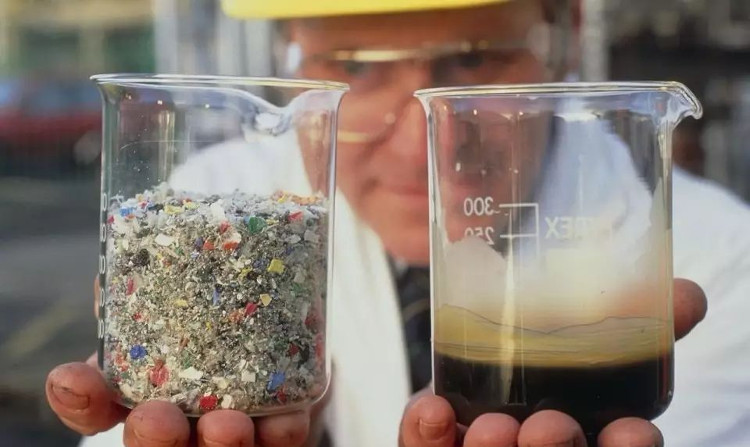Turning plastic into petroleum: 2-in-1 solution for plastic waste
Pollution from plastic waste, nylon and oil depletion are two of the many human problems facing. And the "most nominated" solution for these two problems is turning plastic waste into gasoline.
Decomposed plastic, just created gasoline
Polyethylene is the most popular plastic in the world, creating almost everything from food packaging, plastic bottles, plastic films to nylon bags. On average, about 100 million tons of polyethylene resins are produced annually.

Polyethylene is made from fossil fuels and can be converted back into oil and diesel fuel.
Theoretically, Polyethylene is made from fossil fuels and can be converted back into oil and diesel fuel. However, this is not simple because plastic is a very stable compound.
In 2016, Zhibin Guan - a Chinese chemist from the University of California, joined the Shanghai Institute of Organic Chemistry (China) to find a solution to this problem. The solution is to use chemical catalysts to resolve polymers.
This substance separates hydrogen atoms in the compound, causing carbon atoms to bind together. But once linked, the catalyst breaks it, causing carbon to bind to hydrogen again. This process repeats continuously, helping scientists to change the structure of polyethylene into diesel, or even creating gasoline.
A significant advantage of this method is that the temperature needed to decompose plastic is only 175 degrees Celsius , much lower than most other methods of 400 degrees C or more.
The decomposition time of up to several days with high catalyst price is still the limitation that makes this technology not widely used. However, this is also an expected solution to solve the problem of plastic waste disposal.
Solution made in Vietnam
In Vietnam, turning plastic and rubber into fuel is also a topic of interest of many research groups. One of the typical directions of this research is the technology of waste plastic pyrolysis into FO oil being introduced by the Center for Science and Technology Information and Statistics (CESTI).
This is the technology developed by the Research Center for Petrochemical Technology - Ho Chi Minh City University of Technology. Not only solve the problem of waste plastic treatment, this system can also convert up to 60-70% of the volume of rubber, plastic waste into FO oil used as furnace fuel in the boiler industry, kilns. , evaporator, chimney or for internal combustion engines of ships .

Model of waste plastic pyrolysis system into FO oil.
The method used by the research team is plastic pyrolysis, high temperature waste rubber into gas form and condensation. The amount of oil collected will be separated by the floating properties of the oil.
In addition, the gas obtained from the pyrolysis process is also rotated to make the system's operating fuel, thereby saving considerable fuel consumption.
Units and businesses interested in this technology can contact Ho Chi Minh City Technology Exchange, 79 Truong Dinh, District 1, Ho Chi Minh City for advice and learn more.
- Big break: Recyclable plastic waste will be turned into super clean electricity
- Solution of 'treating' plastic garbage with cactus
- Deep rice eat plastic - solution to minimize landfill burial?
- Why is plastic garbage so difficult to decompose?
- A simple way to block plastic waste from flowing into the sea
- How long does it take for plastic waste to decompose?
- The technology turns plastic waste into edible fungus
- Vietnam is the top 5 countries that discharge most plastic waste into the sea
- The 12-year-old genius invented a plastic waste filter in the ocean
- What happens to a plastic bottle after being thrown into the trash?
- The danger of the ocean
- Producing bricks from ... plastic waste
 Is the magnetic North Pole shift dangerous to humanity?
Is the magnetic North Pole shift dangerous to humanity? Washington legalizes the recycling of human bodies into fertilizer
Washington legalizes the recycling of human bodies into fertilizer Lightning stone - the mysterious guest
Lightning stone - the mysterious guest Stunned by the mysterious sunset, strange appearance
Stunned by the mysterious sunset, strange appearance